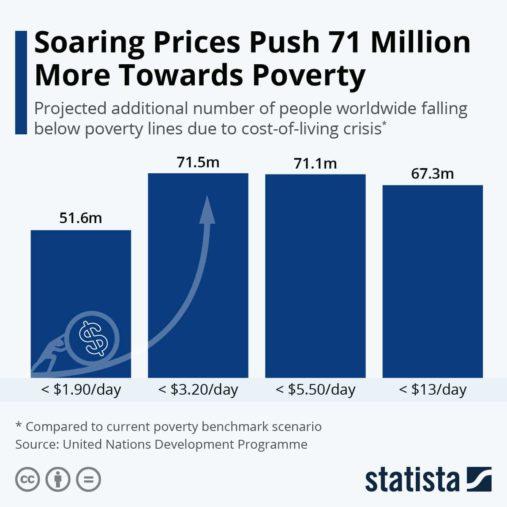Welcome to our roundup of news and current events related to ethics and international affairs! Here’s some of what we’ve been reading this past month:
 Anti-government protests in front of the Presidential Secretariat in Colombo on April 13, 2022. Photo Credit: AntanO via Wikimedia Commons
Anti-government protests in front of the Presidential Secretariat in Colombo on April 13, 2022. Photo Credit: AntanO via Wikimedia Commons
AP: Sri Lanka in political vacuum as talks go on amid crisis
On July 9, three months of peaceful protests by Sri Lankans facing economic hardship—including soaring inflation, a shortage of essentials such as food, medication, and fuel, and rolling blackouts—culminated in protesters storming and occupying the presidential residence and setting fire to the prime minister’s private residence in Colombo. The protestors continue to demand the resignation of President Gotabaya Rajapaksa and Prime Minister Ranil Wickremesinghe, both of whom said they would step down following these events but have not yet officially resigned. Currently in a political vacuum with opposition leaders still unable to reach a consensus on new leadership, the bankrupt nation is also negotiating with the IMF for a bailout program.
Read more about civil resistance, Sri Lanka, and laws of war in Ethics & International Affairs:
Deconstructing Nonviolence and the War-Machine: Unarmed Coups, Nonviolent Power, and Armed Resistance (2021: Volume 35.3)
The End Days of the Fourth Eelam War: Sri Lanka's Denialist Challenge to the Laws of War (2022: Volume 36.1)
The Ethics of (Un)Civil Resistance (2019: Volume 33.3)
 A Ukrainian National Guardsman, during the 2022 Russian-Ukrainian War. Photo Credit: National Guard of Ukraine via Wikimedia Commons
A Ukrainian National Guardsman, during the 2022 Russian-Ukrainian War. Photo Credit: National Guard of Ukraine via Wikimedia Commons
BBC: Ukraine aims to amass 'million-strong army' to fight Russia, says defence minister
Ukraine's Defense Minister Oleksii Reznikov said Ukraine's forces currently number a million and called for faster weapons deliveries, particularly of more effective NATO weapons. Analysts, however, say a major counter-offensive is currently inadvisable and the announcement may be intended to force Russia to commit greater resources to its offensive in the country. Reznikov also said retaking the southern Black Sea coast was crucial to Ukraine’s economy—in order to resume exports of grain via the Black Sea ports—but analysts say this is unlikely at present with much of the country’s military resources committed to fighting Russian forces in the Donbas.
Read more about the war in Ukraine and war crimes in Ethics & International Affairs:
Ukraine: An Ethical Response (March 2022)
War Crimes and the Asymmetry Myth (2021: Volume 35.3)
From Anger to Action: Moral Emotions and the Invasion of Ukraine (March 2022)
 Protestors gathering in front of the Supreme Court after announcement of the ruling overturning Roe v. Wade on June 24, 2022. Photo Credit: John Brighenti via Flickr
Protestors gathering in front of the Supreme Court after announcement of the ruling overturning Roe v. Wade on June 24, 2022. Photo Credit: John Brighenti via Flickr
The New York Times: Under Pressure, Biden Issues Executive Order on Abortion
Following last month’s U.S. Supreme Court ruling overturning Roe v. Wade, which eliminated the constitutional right to abortion that was codified in 1973, U.S. President Joe Biden signed an executive order on July 8 to ensure continued access to abortion medication and emergency conception. Under pressure to respond to the Supreme Court’s decision, the president also said that while the order would preserve some access to services, he hoped women especially will vote in more lawmakers who support restoring abortion rights. Some abortion rights advocates say this order is an important first step, while others urge President Biden to do more, including declaring a public health emergency.
Read more about women’s rights, health security, and human rights in Ethics & International Affairs:
The Global Politics of Health Security before, during, and after COVID-19 (2021: Volume 35.3)
On American Values, Unalienable Rights, and Human Rights: Some Reflections on the Pompeo Commission (2020: Volume 34.1)
The Neglected North Korean Crisis: Women's Rights (2021: Volume 35.1)
 Visualization of UNDP data on the number of people worldwide falling below poverty lines due to rising food and energy prices. Photo Credit: Florian Zandt via Statista
Visualization of UNDP data on the number of people worldwide falling below poverty lines due to rising food and energy prices. Photo Credit: Florian Zandt via Statista
Reuters: Cost-of-living crisis driving 'breathtaking' surge in extreme poverty - UNDP
An additional 71 million people in the world’s most poverty-stricken countries are being pushed into extreme poverty by the current cost-of-living crisis, warned the UNDP in a new report released last week analyzing 159 developing countries. This includes a surge in commodity prices this year that is severely affecting countries in Sub-Saharan Africa, the Balkans, and Asia, among others. UNDP called for cash transfers to the most vulnerable and for an extension of the G20-led Debt Service Suspension Initiative set up during the COVID-19 pandemic. This latest crisis would bring the number of people living below the poverty line (adjusted for cost of living) worldwide to 1.7 billion.
Read more about global poverty, inequality, and equality in Ethics & International Affairs:
Global Poverty, Injustice, and Resistance (2020: Volume 34.3)
Inequality and Austerity: Our Weak Links in Countering COVID-19 (May 2020)
Equality as a Global Goal (2016: Volume 30.2)